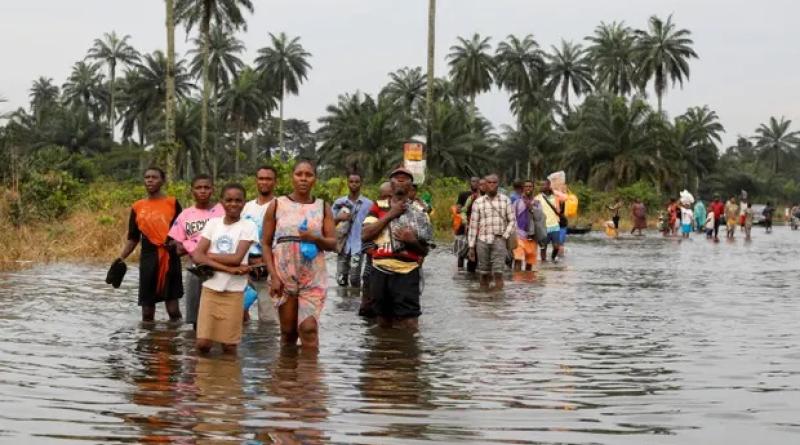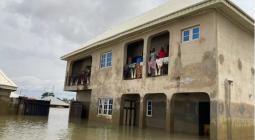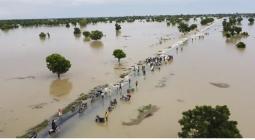‘Everyone has to work so the family can survive’: floods in Nigeria force children out of school and into work

Fears of child exploitation as families forced to send sons and daughters out to work to make ends meet after the country’s deadliest floods
Just before the heavy rains began, most schoolchildren were about to start the new term. Jonah Ovat’s three teenage sons were excited about going back to their secondary school in Obubra. Here in Cross River state, as in other parts of Nigeria, the rains that began in August brought large-scale flooding.
The country’s two major rivers burst their banks and a national disaster was declared in four other states as floodwater drowned farms and destroyed crops worth millions of naira in Obubra.
Now that the rains have subsided, Ovat, 55, was among the farmers whose land and crops were saturated. The family is attempting to rebuild but what has gone for ever, he says, is the boys’ schooldays.
“There’s no more education for the boys because the time they should have spent in class they now use that time to work,” says Ovat. His sons have been labouring on a housing construction site since the start of September. “We don’t have a source of livelihood any more and that’s why everyone, including the children, has to work so that the family can survive.”
The flooding has been the deadliest in the country’s history – at least 600 people killed and about 1.3 million forced from their homes. The water destroyed farms and small businesses, and inundated 150,000 hectares (370,000 acres) of fields, leaving close to 80,000 houses damaged (including 18,000 completely destroyed) and more than 320 roads and bridges impassable.
In rural communities in the coastal Niger delta region, the area worst hit by the floods, hundreds of children have had to stop school because their parents need them to earn money to support their families as they try to recover from the disaster.
“We can’t afford to feed our children, let alone transport them to school,” says Festus Okpa, a father of two daughters who – before the floods – were in junior secondary school in Iyamitet. “Right now, we need our children at work, not at school.”
Authorities estimate that up to 1,000 children in Cross River state have stopped going to school in the aftermath of the floods. Children – some as young as 12 – now spend their time working on farms or in carpentry and car workshops. “The classrooms are empty in the communities that were affected by flood, as children are understandably choosing survival over education,” says an official at the education office in Obubra.
Some families are pessimistic that their children will ever return to school. Ruth Abeng, a widow whose grocery shop was destroyed by the floods, told the Guardian that her 14-year-old son would be pursuing a career as a car mechanic, “if he perfects his skills and begins to earn money as an apprentice”.
“Maybe if he is successful, he may never even return to school again,” she says. “If education becomes too expensive to afford, then he has to focus on the work he is doing right now.”
But concerns are rising over child exploitation increasing in the aftermath of the floods. Children are cheap labour – earning about 300 naira (55p) a day – sometimes in inhumane conditions.
“We work from 7am to 5pm every day and are not allowed to eat until we finish the job for the day,” says Timothy Ojong, 16, who dropped out of school after the floods and has been working on a cocoa farm in the town of Ikom since October. “Many children have been fainting as a result of exhaustion.”
Scientists say the climate crisis is mostly responsible for the intense rainfall Nigeria has witnessed this year, with 31 out of the country’s 36 states affected by the floods. In addition, unchecked urbanisation has wrecked forests and wetlands, allowing for the free flow of water. Nigeria had 10.9m hectares of natural forest covering 12% of its land area in 2010; by 2021, it had lost nearly a 10th of that.
Africa’s most populous nation is struggling to adapt to a changing climate and it is taking a toll on its children. Before the floods, the country already had about 18.5 million children out of school, according to Unicef. No one knows yet how many more the floods will prevent from being in classrooms.
The government is worried, says Okama Amos, director of schools in Cross River state. “We are trying to encourage parents to allow their children to return to school, as the government is making efforts to assist families affected by the floods.”
But classrooms were hit too: as many as 15 schools were damaged in Obubra while four primary schools were shattered by the floods in neighbouring Ikom.
“The government has begun to fix the affected schools,” says Amos. “Children would soon be able to learn in more comfortable classrooms.”
For children forced to choose work over school, education still means a lot, but immediate survival is paramount.
“We want to return to school but that can’t happen if we aren’t sure of what we will eat the next day,” says Ojong, who – with his 14-year-old brother – walks 10km each day to work on a farm. “It is only a person who has food to eat that can concentrate and learn in class.”
cover photo: The flooding killed at least 600 people and forced 1.3 million people from their homes. Photograph: Temilade Adelaja/Reuters





